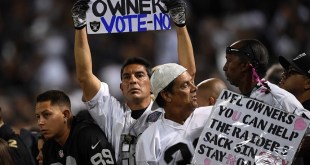NFL owners are meeting in Phoenix this week, and all signs suggest they will vote to approve the Oakland Raiders’ move to Las Vegas today, March 27. Given the numerous uncertainties still surrounding the proposed move, a vote today seems premature. But there is public money up for grabs here, and Raiders owner Mark Davis is all-in on that action.
And though $750 million in public funds to build a state-of-the-art stadium in Sin City does sound really nice, that doesn’t mean it’s a good idea. In fact, the decision to allow the Raiders to move Las Vegas would be, in not just my opinion, a terribly short-sighted action that is more likely to fail miserably than succeed.
The Market
Full disclosure: I was born in Las Vegas. I lived there until I was 12 when my family and I moved to Dallas. I have fond memories of watching UNLV Runnin’ Rebel basketball and independent league hockey games at the Thomas and Mack Center, as well as minor league baseball games at Cashman field…but I always wondered why Las Vegas didn’t have a major sports team. Now that I’m older and doing my best to be 100% objective, it’s easy to see why. Las Vegas just isn’t the right kind of market to support an NFL team.
According to Nielson, Las Vegas is the 40th largest media market in the United States, with a total of 757,840 TV homes.[i] By comparison, the San Francisco-Oakland-San Jose market ranks 6th with 2,488,090 TV homes. And yes, I’m aware that the Raiders’ current market has another NFL team in it. But even if you give the Raiders just half the local market, that’s still about 1.24 million homes, which would put it far ahead of the Las Vegas market at number 21.
Let’s talk population. The San Francisco-Oakland-Hayward, California metropolitan statistical area has 4.67 million people in it, which is far more than double the 2.11 million people in the Las Vegas-Henderson-Paradise area. And trust me when I say that Las Vegas is a town full of people who already have loyalties to other teams. Sure, some of them may already be Raiders fans, but several admittedly unscientific sources I’ve found (here, here, and here) suggest that Las Vegans and Nevadans look elsewhere for a team to root for.
A Vanderbilt economist named John Vrooman shares my concern. Back in July of last year, he told USA Today that the move would mean the Raiders “would be desert-locked in a small economically isolated and lopsided Vegas.” He pointed out that “[t]he Broncos rule the Mountain West. The Cards now rule the Southwest desert. The 49ers have got [Northern California] locked down, and that leaves the Rams and [Chargers] to split [Southern California]. There is no…economic room for the Raiders and the Vegas market doesn’t have the size or depth to carry the club.”
Sure, the Raiders will likely win over many fans in Vegas, but will it really be enough to justify a move away from a remarkably devoted fan base?
The Relocation Fee
It will cost the Raiders far more to move to Las Vegas than it would to stay put. That’s because NFL Franchise Relocation Rules typically require a relocation fee from any team that moves to a new home “territory.” Several factors are taken into account when determining the relocation fee, including both the revenue stream that would be available to the team in the new market, and the stream available to the team in the old market. The fee is meant to “compensate other member clubs for the loss of the opportunity appropriated by the relocating club and/or the enhancement (if any) in the value of the franchise resulting from the move.” Essentially, the fee will be higher if the new market is significantly better than the prior one. This was clearly the case for the Rams, who ended up with a $650 million relocation fee last year. Several sources have reported that the Raiders relocation fee will be between $325 and $375 million, which makes sense when compared to the Rams since the Raiders are moving to an inferior economic market.
But even though it’s significantly lower than what the Chargers ($650M) and Rams paid, $325 to $375 million is no small amount. That’s especially true for the Raiders, whose owner is reportedly worth only $500 million, an amount that pales in comparison to most other NFL owners.
The Cost of the Stadium…Plus Interest
And speaking of costs, let’s not forget that the proposed stadium in Las Vegas would cost upwards of $1.9 billion. Add that to the aforementioned relocation fee, and the numbers suggest it will cost roughly $1 billion more to relocate than if the Raiders built a new stadium in Oakland for $1.3 billion under the Oakland/Alameda County plan.
The NFL and the Raiders are set to contribute a total of $500 million ($200 million from the league’s stadium upgrade loan program, $250 million from the Raiders’ sale of personal seat licenses, and $50 million from Davis) to the $1.9 billion project. Bank of America (BOA) stepped up earlier this month to loan $650 million when billionaire casino mogul Sheldon Adelson withdrew his plan to contribute the same amount in late January. But Clark County Commission chairman Steve Sisolak and other Vegas officials are wondering how plausible it is that the Las Vegas Stadium Authority (LVSA)-the agency that will officially own the stadium-will be able to generate sufficient revenue to make payments on the BOA loan. No one knows the exact terms of the loan (which itself is a problem), but even if the interest rate is just 4%, the LVSA will have to come up with about $46 million in principal and interest payments just for the BOA loan. Eight regular season and 2 preseason games won’t be enough to cover that. The UNLV football team averaged only about 21,000 fans for six home games in 2015, so that won’t be enough. Can they sell enough tickets at concerts? Bowl games? Maybe a Super Bowl or two? That fact that no one knows could be a big problem.
The remaining $750 million is set to come from public bonds to be repaid over 30 years by an increase in hotel room taxes in the Las Vegas area. But according to one Stanford economist, the projection that the taxes would allow the state to repay the bonds was based on some highly-flawed assumptions. Roger Noll, the aforementioned Stanford economist and director of the Program in Regulatory Policy in the Stanford Institute for Economic Policy Research, says Nevada officials relied on economic forecasting studies which predicted that the new 65,000-seat stadium would bring 451,000 new visitors per year, who would spend an average of 3.2 nights per visit, resulting in $650,000 in additional tax revenue. But Noll expressly rejects these financial projections. “Every single thing they made an assumption on has no prior experience anywhere else,” Noll said. “Why would they believe a half a million who would never visit Vegas would suddenly show up because there is a football stadium? It’s so far out there it is a puzzle.”
A Last Desperate Effort
Of course, it should be noted that the City of Oakland and Alameda County have had chances in the past few years to work out something that could have kept the Raiders in Oakland. With the recent trend in teams privately financing their stadiums rather than seeking public funds, it’s hard to blame Oakland for not wanting to raise taxes to build a new stadium. But let’s not kid ourselves here…the Raiders are moving to Las Vegas precisely because it was willing to pony up the public dough, and Oakland was not.
Yes, the City of Oakland and the Oakland City Pro Football Group submitted one final revised plan on Friday in an attempt to get enough “no” votes from NFL owners. But not many people, including Noll, give the last-minute proposal much chance of preventing the move. It’s not necessarily a bad plan, and it could certainly get done if Mark Davis and the Raiders were willing to come to the table. But at the end of the day, it’s clear that Mark Davis’s decision will come down to which location is willing to pay more, no matter how short-sighted that decision may be. Viva Las Vegas!
[i] Nielson defines a TV home as a household that has “at least one operable TV/monitor with the ability to deliver video via traditional means of attenae, cable set-top-box or satellite receiver and/or broadband connection.” The Sports Esquires Putting Sports on Trial
The Sports Esquires Putting Sports on Trial




It’s a money grab to a secondary market and I think in the long run this will be a bad deal for Vegas, gamblers gamble!
I have no doubt. Maybe the Raiders flourish in Vegas, but the more likely scenario to me is that they decide to leave after that first lease is up.
Although a fait accompli, one point that has not been discussed is what one does with the facility for 340 days a year. Besides the Raiders and UNLV, what other events can this place be used for? Especially with the new hockey arena opening in the fall. Also, the transportation situation has not been addressed. There is little if any public transportation in the city (I was there a month ago and relying on buses and monorail won’t get you very far) and the traffic around the strip can be heavy. And it’s not only Vegas with 600,000 people; it’s Clark County, which only has about 850,000. These are very small markets.